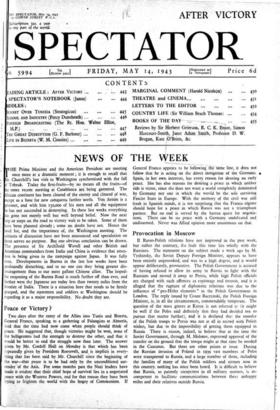Peace or Victory ?
Two _days after the entry of the Allies into Tunis and Bizerta, General Franco, speaking to a gathering of Falangists at Almeria, said that the time had now come when people should think of peace. He• suggested that, though victories might be won, none of the belligerents had the strength to destroy the other, and that it would be better to end the struggle now than later. The answer given by Mr. Cordell Hull on Monday is that which has been repeatedly given by President Roosevelt, and is implicit in every- thing that has been said by Mr. Churchill since the beginning of the war—that peace is tn be had only by the unconditional sur- render•of the Axis. For some months past the Nazi leaders have made it evident that their chief hope of survival lies in a negotiated peace with the Western Powers, and for that reason they have been trying to frighten the world with the bogey of Communism. If
General Franco appears to be following the same line, it does not follow that he is acting on the direct instigation of the Germans. Spain, in her own interests, has every reason for desiring an early peace. She has also reasons for desiring a peace in which neither side is victor, since she does not want a world completely dominated by Germany nor one in which she world be the sole surviving Fascist State in Europe. With the memory of the civil war still fresh in Spanish minds, it is not surprising that the Franco regime should hope for a peace in which Russia was not a triumphant partner. But no end is served by the barren quest for negotia- tions. There can be no peace with a Germany undefeated and undisarmed. Never was Allied opinion more unanimous on that.


























